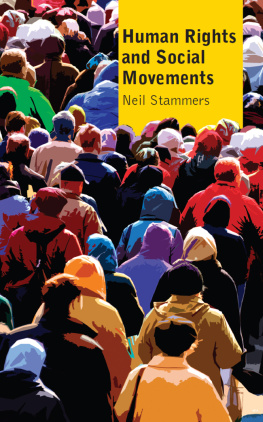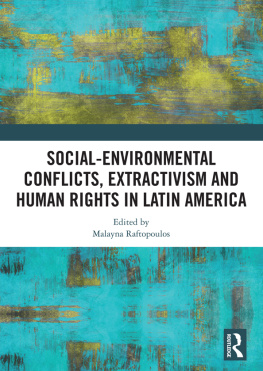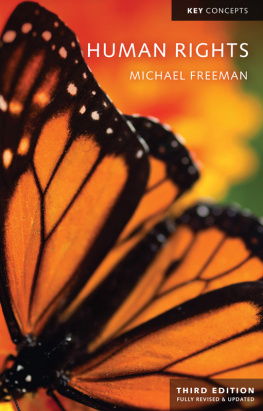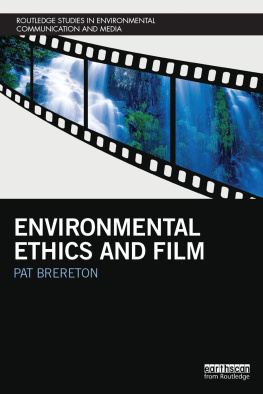Environmental Human Rights
This book is dedicated to my grandparents, James and Audrey Hancock, Lisa Misch and to the memory of Walter Misch.
First published 2003 by Ashgate Publishing
Reissued 2019 by Routledge
Park Square, Milton Park, Abingdon, Oxon, 0X1 4 4RN
52 Vanderbilt Avenue, New York, NY 10017
Routledge is an imprint of the Taylor & Francis Group, an informa business
Copyright Jan Hancock 2003
The author has asserted his moral right under the Copyright, Designs and Patents Act, 1988, to be identified as the author of this work.
All rights reserved. No part of this book may be reprinted or reproduced or utilised in any form or by any electronic, mechanical, or other means, now known or hereafter invented, including photocopying and recording, or in any information storage or retrieval system, without permission in writing from the publishers.
Notice:
Product or corporate names may be trademarks or registered trademarks, and are used only for identification and explanation without intent to infringe.
Publishers Note
The publisher has gone to great lengths to ensure the quality of this reprint but points out that some imperfections in the original copies may be apparent.
Disclaimer
The publisher has made every effort to trace copyright holders and welcomes correspondence from those they have been unable to contact.
A Library of Congress record exists under LC control number:
ISBN 13: 978-1-138-72242-2 (hbk)
ISBN 13: 978-1-315-19354-0 (ebk)
Thanks to all staff and students at Birkbeck College for a great end to 2002. Many thanks also to members of the politics department at Southampton University, especially Tony Evans, Nana Poku, Caroline Thomas, Tony McGrew, Graham Smith, Russell Bentley, David Owen and Andy Mason, for all the discussions that inspired the development of many of the thoughts that find expression in the following pages. Many thanks also to Neil Stammers for both his constructive criticism and insightful comments.
ESRC grant R00429924183 is acknowledged for providing funding for part of this research.
Many thanks to my mother, father and grandparents for all their support and encouragement over the years. Thanks to Dan, Simon and Steph for being such great friends. Thanks also to my friends in Victoria, BC, Laura, Kim, Anne, Elizabeth, Tony and Sarah for a fantastic 1999. Thanks to all the mountains in British Colombia upon whose slopes a great number of the ideas in this research were first considered. Still in Canada, thanks to the Greater Victoria Cycling Coalition for the anti-car stickers and for all their great work on the cycle network in Victoria that kept this author fit and happy during the writing of the first draft.
Thanks to the Southampton triathlon club for the Saturday races in the New Forest and to the Southampton University cycling club for the training runs in the South Downs.
Special thanks to Earth First!ers everywhere for their dedication in raging against the dying of the light.
Most importantly, many, many thanks to Morwenna for everything, for all the hard work, for being a constant source of energy and inspiration and most of all thanks for making me so happy.
| AMA | Automobile Manufacturers Association |
| AWA | Antarctic Wilderness Area |
| CAFOD | Catholic Fund for Overseas Development |
| CAMPFIRE | Communal Areas Management Program for Indigenous Resources |
| CEO | Chief Executive Officer |
| CHEER | Coalition for Health, Environmental and Economic Rights |
| CODEH | Committee for the Defense of Human Rights in Honduras CoP Conference of Parties |
| CPR | Common Property Resources |
| DNA | Deoxyribonucleic Acid |
| DSS | Dispute Settlement System |
| EPA | Environmental Protection Agency |
| EPZ | Export Processing Zone |
| ERT | European Roundtable of Industrialists |
| EU | European Union |
| EUROPABIO | European Association for Bio-industries |
| EZLN | Zapatista Army of National Liberation |
| FAO | Food and Agriculture Organization |
| FDI | Foreign Direct Investment |
| GAO | General Accounting Office |
| GATT | General Agreement on Tariffs and Trade |
| GCIP | Global Climate Information Project |
| GDP | Gross Domestic Product |
| GEF | Global Environmental Facility |
| GEI | Global Economic Institutions |
| ICCPR | International Covenant on Civil and Political Rights |
| ICESCR | International Covenant on Economic, Social and Cultural Rights |
| ILO | International Labor Organization |
| IMF | International Monetary Fund |
| IPCC | Intergovernmental Panel on Climate Change |
| MMT | Methylcyclopentadienyl Manganese Tricarbonyl |
| MNC | Multi National Corporation |
| MST | Movement for Landless People |
| NAFTA | North American Free Trade Agreement |
| NGO | Non-governmental Organization |
| OECD | Organization for Economic Co-operation and Development |
| PCB | Poly Chlorinated Biphenyl |
| PM10 | Particulate pollutant |
| ppb | parts per billion |
| RTZ | Rio Tinto Zinc |
| SAP | Structural Adjustment Policy |
| SLORC | State Law and Order Restoration Council |
| SPDC | Shell Petroleum Development Company |
| TNC | Trans National Corporation |
| UBBWU | United Banners Banana Workers Union |
| UK | United Kingdom |
| UN | United Nations |
| UNCED | United Nations Conference on Environment and Development |
| UNCTC | United Nations Center on Trans National Corporations |
| UNDP | United Nations Development Program |
| UNESCO | United Nations Economic, Social and Cultural Organization |
| UNFCCC | United Nations Framework Convention on Climate Change |
| UNICE | European Employers Confederation |
| US | United States |
| WBCSD | World Business Council for Sustainable Development |
| WHO | World Health Organization |
| WTO | World Trade Organization |
Key Conceptual Questions
All the major environmental problems presently confronting the world are ultimately derived from four general patterns characterizing modern societies, (i) pollution, (ii) overuse or misuse of resources, (iii) biodiversity reduction and (iv) habitat destruction. The research presented here suggests that these environmental problems could be in part addressed through respecting the following two universal human rights; (i) to an environment free from toxic pollution and (ii) to ownership rights of natural resources.
Demonstrating environmental benefits is, of course, insufficient grounds for claiming new human rights. Indeed, post-modernists and relativists remind us that the philosophical grounds upon which foundational claims to any human rights can be substantiated is a contestable issue, with the specified criteria typically reflecting the political predilections of the author (Brown, 1992; Ashley, 1996). The criterion utilized in this research to investigate the existence of environmental human rights will be restricted to existing legal human rights stipulations. It will be demonstrated that the two universal environmental human rights claimed above can be imputed from the existing international law on human rights. This legalistic approach is not without either epistemological problems or political bias and it is appropriate to explain these at the outset of the inquiry.












